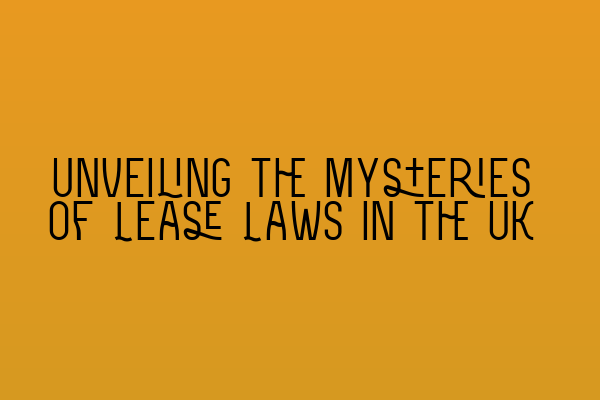Unveiling the Mysteries of Lease Laws in the UK
Are you a tenant or a landlord in the UK? Do you find yourself overwhelmed by the complexities of lease laws? Look no further—SQE Property Law & Land Law is here to shed light on the mysteries surrounding lease laws in the UK.
Understanding the Basics
Lease laws govern the relationship between tenants and landlords. A lease is a legal contract that grants a tenant the right to occupy a property for a specific period, usually in exchange for rent. It establishes the rights and responsibilities of both parties, ensuring a fair and transparent agreement.
Key Components of a Lease
When entering into a lease agreement, it’s crucial to understand its key components. These include:
- Rent: The amount of money paid by the tenant to the landlord in exchange for the right to occupy the property. Rent may be subject to periodic increases.
- Term: The length of time the tenant has the right to occupy the property.
- Responsibilities: The duties and obligations of both the tenant and the landlord. This may include maintenance, repairs, and compliance with local regulations.
- Termination: The conditions under which the lease can be terminated, allowing either party to end the agreement.
Common Lease Types in the UK
There are several types of lease agreements commonly used in the UK:
- Assured Shorthold Tenancy (AST): This is the most common type of lease for residential properties. It offers tenants certain rights and protections, including the right to live in the property for a minimum period and protection against unfair eviction.
- Commercial Lease: This type of lease is used for non-residential properties, such as offices, shops, or warehouses. It differs from residential leases in terms of rights and responsibilities, as well as the length of the lease.
- Ground Lease: A ground lease is a long-term lease where the tenant has the right to use and occupy the land for a specific purpose, such as building a property.
Lease Extension and Renewal
As a lease approaches its expiration date, tenants and landlords may need to consider lease extension or renewal. Lease extension involves prolonging the existing lease, usually in return for additional compensation. Lease renewal, on the other hand, involves creating a new lease agreement.
It is important to familiarize yourself with the legal requirements and procedures involved in lease extension and renewal. Seeking legal advice can help ensure a smooth and fair process.
Seeking Legal Assistance
Understanding lease laws can be daunting, but with the right legal assistance, you can navigate the complexities with confidence. At SQE Property Law & Land Law, our team of experienced solicitors is here to guide you through the intricacies of lease laws.
Whether you’re a tenant seeking to understand your rights or a landlord wanting to ensure compliance with regulations, our expert solicitors can provide you with the insights and advice you need. We offer comprehensive legal services tailored to your specific needs.
If you’re preparing for the SQE exams and want to test your knowledge of lease laws, check out our SQE 1 Practice Exam Questions or SQE 1 Practice Mocks FLK1 FLK2 articles.
Looking to further enhance your SQE preparation? Explore our SQE 2 Preparation Courses or dive into our comprehensive SQE 1 Preparation Courses.
For information about SRA SQE exam dates and registration, check out our article on SRA SQE Exam Dates.
Don’t let the mysteries of lease laws overwhelm you. Contact SQE Property Law & Land Law today for expert guidance and support throughout your lease journey.
